
Join me as we explore the ins and outs of bringing a Peekapoo into your life. From their charming quirks to their tender loving care, we’ll uncover if this adorable breed is the piece of the puzzle your family has been looking to find. Let’s get started on this fluffy journey together!
TABLE OF CONTENTS
- Peekapoo Quick Breed Summary
- Origin of the Peekapoo
- Peekapoo's Palette: Exploring the Physical Charms of This Unique Breed
- Unraveling the Peekapoo Personality: A Companion Full of Character
- Comprehensive Care Guide for Peekapoos: Nurturing Your Furry Companion
- Peekapoo Pampering: Essential Grooming Tips for Your Furry Friend
- Navigating Health Challenges: Understanding Peekapoo Health Concerns
- Financial Guide to Owning a Peekapoo: Understanding the Costs
- FAQs About Owning a Peekapoo
- So, Is the Peekapoo Right for You?
Peekapoo Quick Breed Summary
Origin of the Peekapoo
The Peekapoo, an enchanting mix of Pekingese and Poodle, has been stealing hearts as the ultimate companion dog, especially suited for those with allergies. Contrary to what some may believe, this breed is exclusively a blend of a miniature or toy Poodle with a Pekingese—not a standard Poodle. This mix creates a unique dog that’s not recognized by traditional Kennel Clubs but does hold a place of honor with the American Canine Hybrid Club due to its designer status.
Tracing its roots back to the 1950s, the Peekapoo predates many of the popular ‘doodle’ breeds and was among the first to be bred specifically for its low-shedding, hypoallergenic coat. This was a nod to the poodle’s enviable traits while aiming to encapsulate the Pekingese’s sturdy, companion-focused nature.
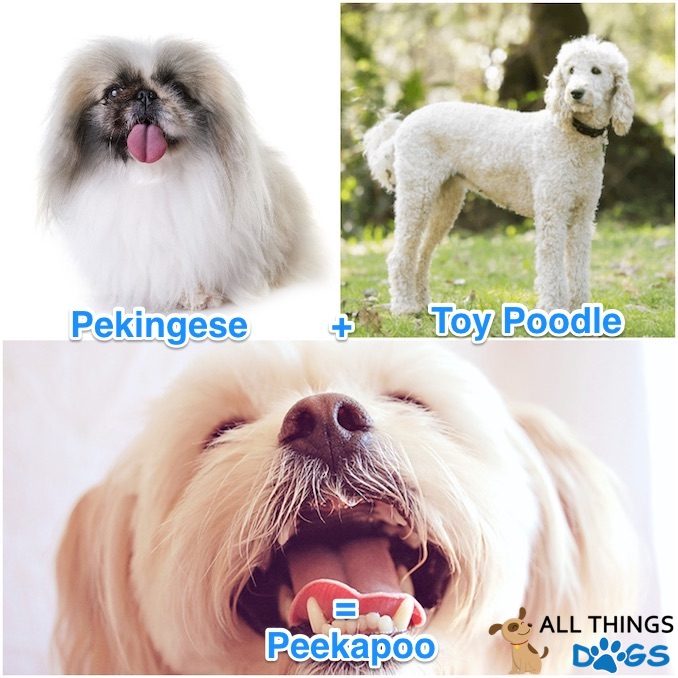
This crossbreed has actually been around far longer than most of the doodle breeds, originating around the 1950s and becoming popular in the 1960s. They were initially bred as a companion dog boasting a low shedding, hypoallergenic coat thanks to the mix with the poodle.
To understand a little more about the breed, we’ll have a quick run down on it’s ancestors! The Pekingese and the Poodle!
The Pekingese: The Lion Dog of China
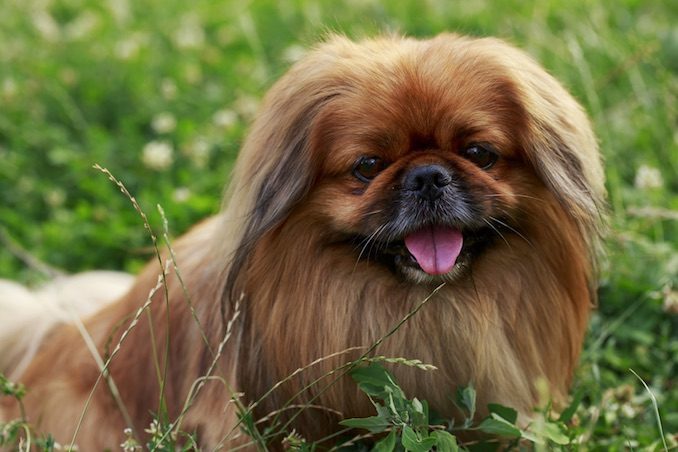
Originating from the lap of Chinese royalty, the Pekingese breed was a fixture in ancient Chinese palaces, designed to resemble the majestic lion. Known affectionately as “Pekes,” these dogs are not just lap dogs but guardians of their realm. Their regal demeanor and stubborn streak make them challenging to train, but their loyalty is unquestioned. Due to their brachycephalic nature, Pekes require a cooler, stable environment as they are prone to breathing challenges and are particularly susceptible to heat stress.
The Poodle: A Scholar in Dog’s Clothing

On the flip side, we have the Poodle, originally bred as a water retriever in Germany, despite its strong association with French culture. Ranked as the seventh most intelligent dog breed by the American Kennel Club, Poodles come in three sizes: toy, miniature, and standard. The Peekapoo gets its delightful characteristics from either the toy or miniature varieties. Known for their hypoallergenic coats, which trap dander within their tight curls, Poodles are not just smart; they’re also incredibly clean. Their love for activities, especially swimming, ties back to their water dog roots, making them both fun-loving and easy to train.
These energetic dogs form strong bonds with their families and don’t take kindly to being left alone, often leading to bouts of separation anxiety. By blending these two distinct breeds, breeders hoped to mitigate some of the less desirable traits while enhancing the positive characteristics, such as intelligence and a hypoallergenic coat. The Peekapoo stands as a testament to this successful genetic mash-up, bringing the best of both worlds into a compact, loving companion that fits perfectly into the modern family.
Peekapoo’s Palette: Exploring the Physical Charms of This Unique Breed
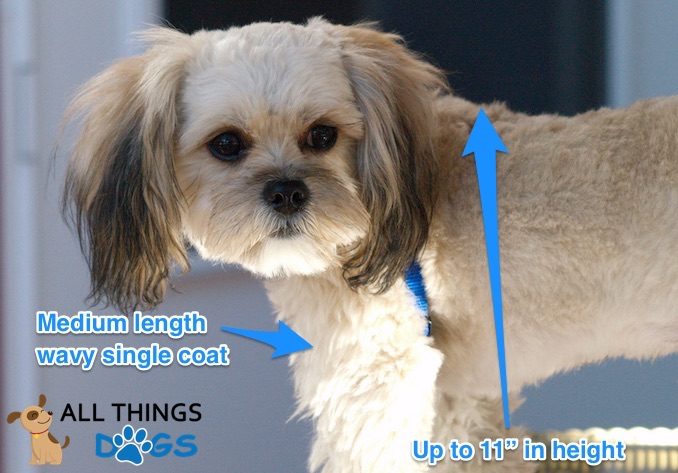
This Pekingese miniature poodle mix sports an array of charming physical features that make it a standout pet. This section breaks down their size and build, coat colors and texture, and other distinctive traits that define this adorable breed.
Size and Build
The Peekapoo is considered a small breed dog, typically measuring between 9 to 11 inches at the shoulder. This compact size makes the Peekapoo an excellent choice for apartment dwellers or those with limited space. They generally weigh between 8 to 20 pounds, with puppies weighing less than 8 pounds classified as miniature Peekapoos. Their build is sturdy yet delicate, reflecting a well-balanced mixture of their Pekingese and Poodle lineage. This blend results in a dog that’s both cuddly and capable of participating in playful activities.
Color and Coat
Peekapoos come in a rich tapestry of colors including silver, white, cream, apricot, red, chocolate, and black. This variety allows potential owners to choose a puppy that not only fits their lifestyle but also their aesthetic preferences. The coat of a Peekapoo can vary significantly due to the influence of its Poodle ancestry; it ranges from curly to wavy, possessing either the dense fluffiness of the Pekingese or the more structured curls of the Poodle. This hybrid’s coat is designed to be low-shedding, making the Peekapoo a feasible option for allergy sufferers.
Distinctive Features
One of the most endearing traits of the Pekingese poodle is its expressive face, dominated by large, soulful eyes that seem to reflect a deep understanding and empathy. Their snout is typically shorter, inheriting a hint of the brachycephalic nature of the Pekingese, yet not as pronounced due to the moderating influence of the Poodle’s longer muzzle. Ears can hang close to the head, soft and feathered, accentuating their gentle and approachable demeanor.
The Peekapoo often inherits the Poodle’s intelligence and the Pekingese’s courage, making it not only a companionable pet but also a spirited one, ready to protect its family or curl up for a quiet evening.
Each Peekapoo is a unique blend of its parents’ best traits, with physical characteristics as varied as their personalities. This bespoke blend ensures that no two Peekapoos are exactly alike, each bringing their own special flair to the breed’s growing popularity.
Unraveling the Peekapoo Personality: A Companion Full of Character
The Peekapoo, a blend of the protective Pekingese and the intelligent Poodle, presents a unique personality that makes them more than just pets—they’re companions, protectors, and part of the family. Their temperament is shaped by a combination of genetic traits from both parent breeds, resulting in a dog that is affectionate, playful, and sometimes a bit reserved. Let’s explore the facets of the Peekapoo personality.
Loyalty
At the heart of this Pekingese poodle’s personality is unwavering loyalty. This breed develops deep bonds with their owners and often becomes particularly attached to one person in the household. Their loyalty manifests in constant companionship—following you from room to room, sitting by your side, and protecting you. This guarding behavior, inherited from the Pekingese, ensures they are always alert and watchful, ready to signal if anything is amiss.
Friendliness
While Peekapoos cherish their family, they can be aloof with strangers. Their initial distrust can make introductions to new people a slow process. However, once they recognize someone as a friend, their warm and affectionate side shines through. They do like the sound of their own bark, which can be a way of asserting themselves with unfamiliar faces.
Playfulness
Peekapoos possess a playful streak that belies their sometimes stoic nature. They enjoy interactive games and will often initiate play with their favorite toys. Their playful behavior is a great way to engage them in physical activity, which is essential for their well-being.
Energy Level
This breed has a moderate energy level. They are lively enough to enjoy daily walks and playtime, but they also appreciate calm evenings at home. Their energy levels make them suitable for a variety of living situations, from apartments to homes with yards.
Intelligence
Inherited from their Poodle ancestry, Peekapoos are notably intelligent. They are quick to learn and can master basic commands as well as more complex tasks. This intelligence also means they require mental stimulation to prevent boredom, which can lead to destructive behavior.
Adaptability
Peekapoos are quite adaptable, able to thrive in different environments as long as they are close to their owners. Their small size and moderate exercise needs make them excellent companions for urban dwellers, though they do best in quieter settings where their sensitive nature won’t be overwhelmed.
Family Compatibility
Peekapoos generally do best in homes with older children or adults only. They are not suited to rough play and can become snappy if overwhelmed by noisy or boisterous environments. They tend to be reserved around other dogs and might prefer being the only pet in the household, though they can coexist with other animals if raised together from a young age.
The Peekapoo’s complex personality makes them a fascinating breed to live with. They blend affection, intelligence, and a touch of independence into a small, lovable package that can fit well into many different types of households. Their adaptability, combined with their playful and loyal nature, makes them an excellent family pet for those who can provide the companionship and engagement they thrive on.
Comprehensive Care Guide for Peekapoos: Nurturing Your Furry Companion
Owning a Peekapoo can be a delightful experience, filled with joy and companionship. To ensure that your Peekapoo thrives, it’s crucial to provide them with proper care tailored to their specific needs. This guide covers everything from diet and exercise to mental stimulation and training.
Feeding and Diet Options
Because they are small dogs with moderate energy levels, the Peekapoo’s diet should be formulated for a small breed with a similar energy profile. High-quality dog food that provides balanced nutrition is essential. Depending on your dog’s age, activity level, and health, you might choose between dry kibble, wet food, or a combination of both. Peekapoos should eat 1 to 1.5 cups of dry food per day, divided into two meals, is typically sufficient. Always ensure fresh water is available, and consult your vet to tailor your Peekapoo’s diet to their specific dietary needs, especially if they inherit the Pekingese’s sensitive stomach.

Exercise and Activities They Might Enjoy
Despite their small size, the Pekingese Miniature Poodle mix is lively and enjoys being active. Daily walks are essential, with at least 30 minutes to an hour of exercise daily split into two sessions to keep them physically fit and mentally happy. They also enjoy interactive games like fetch, agility training, or hide and seek which help keep their minds active and their bodies engaged. Safety precautions during exercise include keeping your Peekapoo on a leash in public areas and avoiding overly strenuous activities that could lead to injuries due to their small stature and potential for back issues.
Mental Stimulation
Mental stimulation is crucial for this intelligent breed. Puzzle toys, training sessions, and regular playtime can help keep their minds sharp and prevent boredom, which might lead to destructive behavior. Teaching them new tricks or commands not only stimulates their brain but also enhances your bond with them.
Training
Peekapoos are intelligent and can be eager to please, making them relatively easy to train compared to other small breeds. However, they can inherit the Pekingese’s stubbornness, which might require a bit of patience during training sessions. Positive reinforcement techniques such as treats, praise, and play are highly effective. Start training your Peekapoo at a young age to establish good behaviors and social skills. Consistency is key, so regular, short training sessions are more effective than less frequent, longer ones.
Raising Puppies of this Breed
Raising Peekapoo puppies requires a commitment to socialization and early training to ensure they grow into well-adjusted adults. Expose them to different environments, sounds, people, and other animals under controlled conditions to foster their confidence and help them develop a calm demeanor. Early vet visits for vaccinations and check-ups are crucial to monitor their health and development. Setting a routine for feeding, potty breaks, and bedtime can also help your puppy feel secure and aid in housebreaking efforts.
Caring for a Peekapoo involves a blend of proper nutrition, regular exercise, mental challenges, consistent training, and loving interaction. With the right approach, your Peekapoo will not only lead a healthy, happy life but also become a cherished member of your family. Each Peekapoo may have unique needs, so staying attuned to their health and happiness is key to a long and rewarding companionship.
Peekapoo Pampering: Essential Grooming Tips for Your Furry Friend
Grooming is an essential part of keeping your Peekapoo happy and healthy. Their unique coat and build require regular maintenance to prevent issues and ensure they look their best. Here’s a comprehensive guide to managing the grooming needs of your Peekapoo, from bathing rituals to nail care.
Bathing
Peekapoos don’t require frequent baths, but a monthly wash will keep their coat clean and reduce allergens. Use a mild dog shampoo that’s gentle on their skin, especially since some may inherit the Pekingese’s sensitive skin. Ensure a thorough rinse to prevent irritation from shampoo residue. Bathing too frequently can strip their coat of natural oils, so adjust the schedule based on your dog’s lifestyle and activity level.
Coat Care
The Peekapoo’s coat can range from curly to wavy, inheriting traits from both the Pekingese and the Poodle. Brushing their coat several times a week is crucial to prevent matting and tangles, especially if they have the Poodle’s tighter curls. A slicker brush or a metal comb works well for this purpose. During shedding seasons, they may require daily brushing to manage loose hair and maintain coat health. Regular trimming every few months will help keep their coat manageable and tidy.
Nail Care
Regular nail trimming is essential to prevent discomfort and mobility issues in your Peekapoo. Their nails should be clipped every 3-4 weeks. If you can hear their nails clicking on the floor, it’s time for a trim. For owners uncomfortable with doing this at home, a professional groomer or vet can provide this service safely.
Ear and Teeth Care
Peekapoos’ floppy ears can trap moisture and debris, making them prone to ear infections. Check their ears weekly for signs of redness, bad odor, or unusual discharge. Clean their ears gently with a vet-approved ear cleaner. Dental care is also critical; regular brushing of their teeth with dog-specific toothpaste will help prevent dental disease, which is common in smaller breeds. Aim to brush their teeth several times a week.
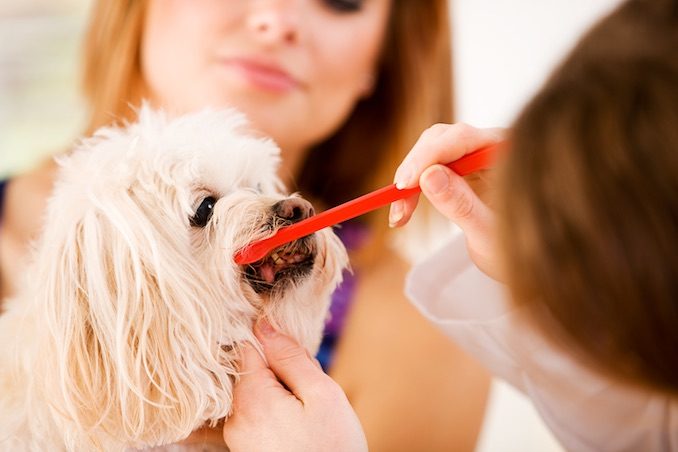
Proper grooming is not just about keeping your Peekapoo looking good—it’s about maintaining their overall health. Regular grooming sessions also provide an excellent opportunity to strengthen your bond with your pet while keeping an eye on any health changes or issues. Start these grooming habits early, so your Peekapoo grows to enjoy and comfortably participate in their grooming routine.
Navigating Health Challenges: Understanding Peekapoo Health Concerns
The Peekapoo, like all breeds, comes with its own set of potential health issues. Understanding these common health problems can help you provide the best care for your furry friend, ensuring they lead a healthy and happy life. Here’s a breakdown of the main health concerns typically seen in Peekapoos.
Brachycephalic Airway Syndrome
Due to their Pekingese heritage, Peekapoos may inherit the brachycephalic traits of their ancestors. This condition is characterized by a shortened skull shape, which can lead to breathing difficulties. Symptoms include noisy breathing, snorting, and in severe cases, collapse from lack of oxygen. Owners should monitor their Peekapoo during exercise and avoid exposing them to extreme heat or stress.
Dental Issues
Small breeds like the Peekapoo are prone to dental problems due to the crowding of teeth in their small jaws. Regular dental check-ups and daily brushing are essential to prevent periodontal disease, which can lead to tooth loss and affect the dog’s overall health.
Patellar Luxation
This common problem in small breeds involves the dislocation of the kneecap, which can cause pain and lameness. Patellar luxation may require surgical intervention in severe cases, although many dogs live comfortably with minor cases of this condition managed by weight control and careful exercise.
Progressive Retinal Atrophy (PRA)
A genetic condition that leads to the gradual deterioration of the retina, PRA can eventually cause blindness in the affected dog. Early diagnosis is crucial to manage this condition, although there is no cure. Regular eye exams by a veterinarian can help catch PRA early, potentially slowing its progression.
Hypothyroidism
Peekapoos may also be susceptible to hypothyroidism, a condition where the thyroid gland does not produce enough hormones, leading to issues like obesity, lethargy, and skin problems. Fortunately, hypothyroidism can be easily managed with daily medication once diagnosed.
While the Peekapoo can face several health challenges, many can be managed or treated with the right care and attention from a devoted owner. Regular vet visits, a healthy diet, and an active lifestyle are crucial in preventing and managing these issues, helping your Peekapoo live a long and fulfilling life. Knowing these potential health problems will equip you to better care for your Peekapoo, ensuring they remain a happy and healthy member of your family.
Financial Guide to Owning a Peekapoo: Understanding the Costs
Owning a Peekapoo brings joy and companionship, but it also comes with financial responsibilities. Understanding both the initial and ongoing costs, as well as preparing for potential emergencies, can help you ensure that you’re ready to provide the best care for your new furry friend. Here’s a detailed breakdown of what you can expect to spend.
Initial Costs
- Purchase Price: Depending on the breeder’s reputation and the puppy’s lineage, the cost of a Peekapoo can range from $275 to $1,450.
- Veterinary Exams: Initial veterinary visits for vaccinations, health screenings, and microchipping can cost between $100 and $300.
- Spaying/Neutering: If not included with your purchase, these procedures can cost anywhere from $200 to $500.
- Supplies: Essential supplies such as a crate, bedding, bowls, collar, leash, and grooming tools can total $200 to $500.
- Training: Basic obedience classes are recommended, especially to counteract any stubborn traits. These can range from $50 to $200 for a series of classes.
Ongoing Costs
- Food: High-quality dog food tailored to small breeds costs about $20 to $40 per month.
- Grooming: Professional grooming is necessary for the Peekapoo’s coat, typically every 6 to 8 weeks, costing around $40 to $60 per session.
- Routine Veterinary Care: Annual check-ups, vaccinations, and preventive medications for parasites can range from $200 to $400 per year.
- Pet Insurance: While optional, pet insurance can help manage costs, typically ranging from $30 to $50 per month.
Emergency Costs
- Health Emergencies: Conditions like brachycephalic airway syndrome or patellar luxation may require surgery, which can cost anywhere from $500 to $5,000.
- Accidents: Treatments for accidental injuries can also be expensive, potentially adding thousands to your yearly expenses.
- Emergency Boarding or Care: If you need to unexpectedly board your dog or require emergency pet care, costs can rapidly accumulate.
While the Peekapoo is a small breed with a heart full of love, the financial commitment to their health and happiness is significant. Planning for these expenses will ensure that you can enjoy the company of your Peekapoo without financial strain. Regular savings and an emergency fund specifically for pet care can also help manage unexpected costs, ensuring your Peekapoo lives a healthy, happy life alongside you.
FAQs About Owning a Peekapoo
How well do Peekapoos get along with other pets?
Peekapoos can be somewhat territorial and may prefer being the only pet in the home. However, with early socialization, they can learn to coexist peacefully with other dogs and even cats. It’s best to introduce them to other pets gradually and in a controlled environment. Keeping interactions positive and rewarding them for calm behavior can help foster good relationships. Overall, the success of integrating a Peekapoo with other pets heavily depends on their individual personality and the owner’s commitment to training.
Is a Peekapoo a good choice for first-time dog owners?
Peekapoos can be a great choice for first-time dog owners due to their manageable size, affectionate nature, and intelligence which makes them relatively easy to train. However, their need for regular grooming and potential stubbornness inherited from the Pekingese side requires a commitment to ongoing care and training. New owners should be prepared to deal with these challenges and might consider obedience classes to help establish good habits early. Additionally, understanding their health needs and ensuring regular veterinary visits is crucial. Their friendly and loving demeanor makes them wonderful companions for those willing to invest the time and effort.
Can Peekapoos live in an apartment setting?
Peekapoos are well-suited for apartment living due to their small size and moderate exercise needs. They do require daily exercise to stay healthy and happy, which should include walks and playtime. Noise levels should be managed as they can be prone to barking, especially if they perceive strangers or unusual activities around them. Providing mental stimulation through toys and puzzles can also help keep them calm and content. As long as their physical and mental needs are met, Peekapoos can thrive in an apartment environment.
What should I do if my Peekapoo shows signs of separation anxiety?
If your Peekapoo shows signs of separation anxiety, such as excessive barking, destruction, or distress when alone, it’s important to address this behavior promptly. Start by creating a safe, comfortable space for them to stay while you’re gone, and practice short departures to gradually get them used to being alone. Leave them with engaging toys or treat puzzles to keep their mind occupied. If the problem persists, consider consulting a professional dog trainer or behaviorist for more structured intervention. Ensuring your Peekapoo has adequate exercise and mental stimulation before you leave can also reduce anxiety.
Are Peekapoos difficult to housebreak?
Housebreaking a Peekapoo can be challenging, partly due to the Pekingese trait of stubbornness. Consistency, patience, and positive reinforcement are key components of successful house training. Setting a regular schedule for meals and potty breaks and sticking to it helps establish a routine. Crate training can also be an effective method as it taps into the dog’s natural desire not to soil their sleeping area. If difficulties persist, it may be beneficial to seek advice from a professional trainer who can provide personalized tips and strategies.
So, Is the Peekapoo Right for You?
Deciding if a Peekapoo is the right companion for you involves weighing their characteristics against your lifestyle and preferences. Here’s a helpful guide to determine if this charming breed matches what you’re looking for:
Peekapoos Are For
- Allergy Sufferers: Thanks to their Poodle heritage, Peekapoos have a low-shedding coat that is more tolerable for people with allergies.
- Apartment Dwellers: Their small size and moderate exercise needs make them ideal for living in smaller spaces, including apartments.
- First-Time Dog Owners: Peekapoos are relatively easy to train and manage, making them a good choice for first-time owners who are ready to engage in basic training and regular grooming.
- Active Singles or Seniors: They make excellent companions for those who can dedicate time to their care, enjoy regular walks, and engage in play.
- Families with Older Children: Their gentle nature makes them suitable for families with older children who understand how to interact with small dogs respectfully.
Peekapoos Are NOT For
- Households with Very Young Children: The breed’s small size and sensitivity to rough play can make interactions with young children risky.
- Those Looking for a Low Maintenance Dog: Peekapoos require regular grooming to maintain their coat and prevent matting, alongside needing engagement to prevent separation anxiety.
- Highly Active Families: While Peekapoos enjoy a good walk or play session, they may not be able to keep up with very active or outdoorsy families looking for a dog that can handle long, strenuous activities.
- People with Very Long Work Hours: This breed can develop separation anxiety if left alone for extended periods regularly.
In conclusion, Peekapoos offer a lot of love and companionship but do come with specific needs. Evaluating your ability to meet these needs will help you determine if a Peekapoo is the right addition to your life. If you’re looking for a small, intelligent, and affectionate dog and can commit to their care requirements, a Peekapoo could be the perfect furry friend for your home.



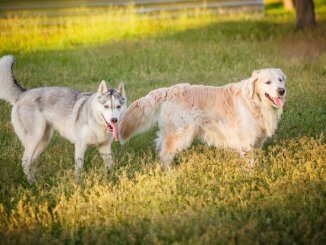
Great information . Informative and very accurate from what I have experienced with my 6 month old puppy.
Looking for a pekapoo breeder in NJ…sadly I lost my pekapoo Tink in November after 14 wonderful years. Looking to get another one to love!
Hi Christine,
I’ve posted your comment in hope of someone being able to recommend a breeder in NJ for you. Best of luck!
My baby will be 13 this July. He’s been y life saver & constant companion. Thank you for all of the great info